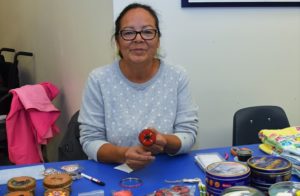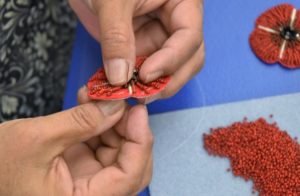Beading artisan crafts to remember Indigenous veterans

By Kelly Anne Smith
NORTH BAY— An Anishinaabekwe artisan from Nipissing First Nation can hardly keep up with the demand for her beautiful, beaded poppy pins.
Indigenous people wear the crafted pins for Remembrance Day to commemorate someone they knew who fought for Canada. Lily Armstrong starting beading the poppies about five years ago.
“If you wear the beaded one, it tends to have meaning about a Native veteran.”
This year, Lily is using porcupine quills in her pattern.
“Every year I change designs to make it different.”
Lily started creating other pins for awareness such as Orange Shirt Day.
“My husband needed an orange shirt to wear for school. I said I’d bead him something. So I stayed up the night before and beaded him an orange t-shirt.
“I change the way I bead on the orange t-shirts too. This one goes all straight across and this one is curved. Sometimes I start in the middle, make a bead and go around and round, for variety.”
About three years ago, she started beading red dress pins for MMIWG.
There are heart felt messages behind Lily’s art.
“If I’m beading a medallion for someone, I have to think about it for awhile. There is meaning in the medallion when I’m done— a story.”
Lily beaded her husband Alex a medallion some time ago.
“There is a story to all of the circles of different colours. There are eight little flowers all around the sun. I told my husband those are for our eight grandchildren. I had a feeling. Now we have eight grandchildren. It turns out that a lot of my artwork are stories.”
Lily learned how to bead from her mother Nora Goulais.
“I watched and learned. I would buy a small glass vial of beads for 10 cents from Martha Clemens who lived close by. A lot of the crafts I learned by watching others.”
 Lily’s special pins are sought after so she tends to spend much of her time beading.
Lily’s special pins are sought after so she tends to spend much of her time beading.
“I start about eight in the morning. Some days I go to about midnight. I’ll take time out for lunch and supper, go visit the grandkids and come back home and start again.”
Lily appreciates the variety of materials available to beaders.
“Now they do the beading on a felt material. With my needles, it’s easy to push through rather than through a leather. But I do put on a leather backing (on a poppy). My earrings have a leather backing. If I don’t have to sew on the leather, I won’t do it because it’s a lot harder to do.”
She has created beading kits with needles, beads, felts, clamps, thread, metal feathers, jewels and earring posts.
“At Christmas time, this is what I give the kids. I don’t add any designs in because I want them to find their own design.”
Her granddaughter Angel and her friends have inspired Lily to make earrings for regalia for pow wows.
“They call it pow wow bling. They say the shinier the better.”
Lily is pleased with the resurgence of culture. She enjoys teaching kids at the Cultural Centre in Nipissing First Nation.
“I love it when I see young people starting it. On Nipissing, a lot of young people are getting into the beading.”
Around Remembrance Day, the popularity of the beaded poppy means Lily usually runs out of poppies.
“I’ve seen these around for about the last 10 years, but they have been around longer. Now everyone is wearing them.”
Lily Armstrong says people wearing the beaded poppies have a stronger connection to an Indigenous veteran.
“I mostly think of my great uncle George who was in the war. I never met him. We grew up in his home which became our family home and many years later became my son Davis’ home. Now, his children live in the property. I also think of the many from Nipissing First Nation who went to war.”
On social media, Nipissing First Nation Chief Scott McLeod urged people who wear the beaded poppy to still contribute to The Royal Canadian Legion Poppy Campaign.
“…be sure to still donate to the Poppy Campaign every year. Our veterans depend on the support of money donations each year.”
It’s estimated 12,000 Indigenous men and women served in three wars for Canada. At least 500 First Nations, Métis and Inuit people perished.

